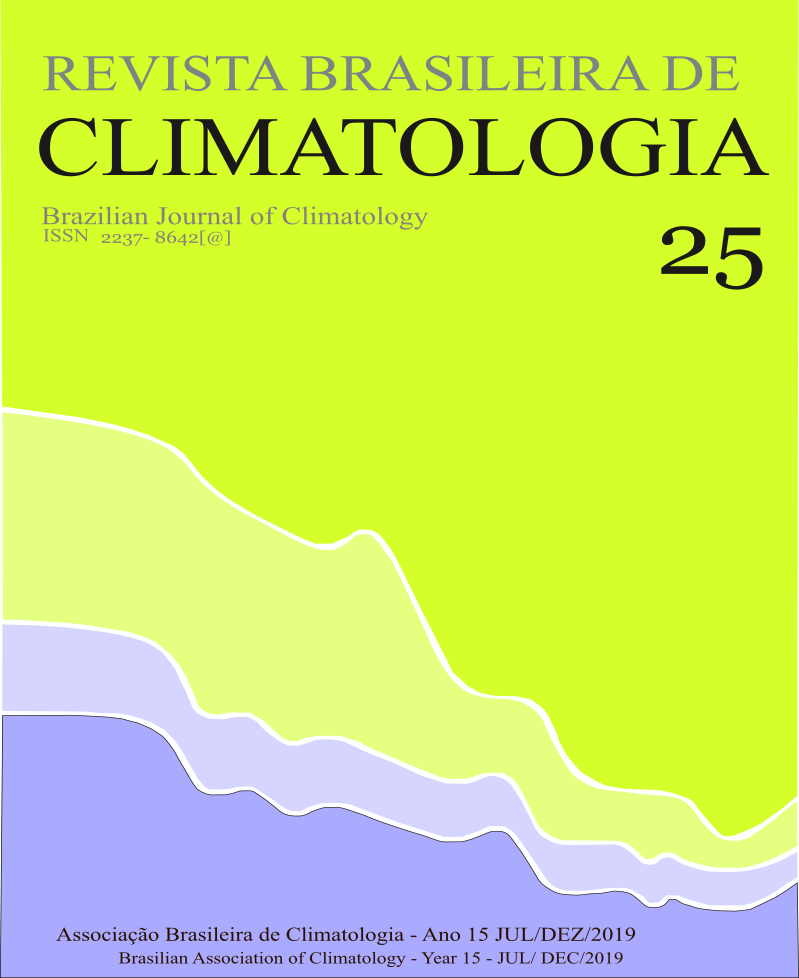MULTISCALE ENVIRONMENTAL MONITORING IN URBAN TOPOCLIMATE
DOI:
https://doi.org/10.5380/abclima.v25i0.62392Keywords:
Urban Monitoring, micrometeorological variables, Wavelets, Cross Wavelet Transformed, Environmental SustainabilityAbstract
Climate is a complex system subject to much natural and anthropogenic interference. Urban microclimates and topoclimates need effective methodologies to localize coexisting phenomena, including multiscale approaches that demonstrate their relational character. Air temperature, air relative humidity, and wind are microclimatic variables that can be evaluated with respect to their qualitative energy flow characteristics. The technical performance of this monitoring depends on a good estimate of the statistics of the digital signal assessed, which in turn represents greater care in the management and implementation of structural change indicators derived from frequency-domain modeling. Therefore, this study aimed to analyze the power spectra of the air temperature, air relative humidity and wind data series using the traditional Morlet Continuous Wavelet Transform (CWT) and the Cross Wavelet Transform (XWT), with Wavelet Coherence (WC) analysis. The daily, monthly and annual scales were studied, and the results demonstrated significant interrelationships between the variables. The WC values found were validated by the Monte Carlo method, scalograms and spectrograms, representing seasonal and daily cycle frequencies. The urban fractions presented behavior in accordance with the seasonality of tropical climates of the Cerrado, as well as of interference of the urban roughness. The CWT, XWT and WC tools are adequate for urban monitoring and planning analyses, qualitatively reflecting the urban dynamics of microenvironments.Downloads
Downloads
Published
How to Cite
Issue
Section
License
A aprovação dos artigos implica a aceitação imediata e sem ônus de que a Revista Brasileira de Climatologia terá exclusividade na primeira publicação do artigo. Os autores continuarão, não obstante, a deter os direitos autorais. Os autores autorizam também que seus artigos sejam disponibilizados em todos os indexadores aos quais a revista está vinculada.
Os autores mantém seus direitos de publicação sem restrições
A Comissão Editorial não se responsabiliza pelos conceitos ou afirmações expressos nos trabalhos publicados, que são de inteira responsabilidade dos autores.
A Revista Brasileira de Climatologia oferece acesso livre imediato ao seu conteúdo, seguindo o entendimento de que disponibilizar gratuitamente o conhecimento científico ao público proporciona maior democratização do conhecimento e tende a produzir maior impacto dos artigos publicados. Os artigos publicados na revista são disponibilizados segundo a Licença Creative Commons CC-BY-NC 4.0 (https://creativecommons.org/licenses/by-nc/4.0/). Segundo essa licença é permitido acessar, distribuir e reutilizar os artigos para fins não comerciais desde que citados os autores e a fonte. Ao submeter artigos à Revista Brasileira de Climatologia, os autores concordam em tornar seus textos legalmente disponíveis segundo essa licença




